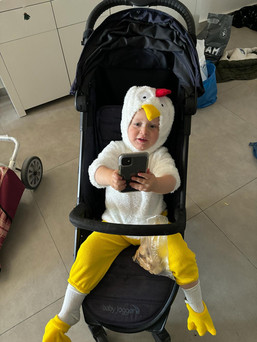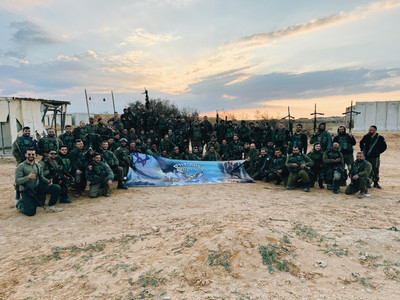In loving memory of Tchelet
- Anne
- Mar 29, 2024
- 8 min read
I have delayed writing another blog because in thinking what to write I struggle with getting a balance between the everyday aspect of our lives and the war - in fact that applies to our life in general at the moment! A few people have asked when my next blog will be out and then events this week inspired me to write.
We have been able to go to England a couple of times to see the family most recently for Noah’s first birthday. That was very special.
This week we celebrated the festival of Purim. The original events took place in In the 5th century BCE in what was one of the darkest periods in Jewish history up to that time. The first temple had been destroyed and the land of Israel had been denuded of its Jews, barely 40,000 left. The story of Purim is told in the Book of Esther, whose eponymous heroine plays the leading role in saving her people from a massacre planned by the book’s villain, Haman. Through the unity of the Jewish people she manages to overturn a decree to have the Jewish people annihilated. The evil Haman is the architect of the plan which Esther foils. Plus ça change plus c’est la même chose! So, as you can imagine we approached Purim with so many varied emotions this year.
The festival is celebrated by reading the Megillah Esther, the book of Esther, in the evening and the morning, dressing up in fancy dress, partying, giving gifts and donating to charities for the poor – most of which you don’t feel like doing during a war. The attitude taken was ‘lets celebrate for us and those who can’t’. Adults and children alike often dress up as superheroes who are always popular. It may not be considered politically correct elsewhere but here children are told that soldiers are superheroes – especially their fathers serving in the army – so there were a lot of children dressed as soldiers. Last year my amazing friend Sharon took it upon herself to learn to read the first three chapters only, which basically cover the genocide. She felt a responsibility to recount that part of the story, now living in Israel, as the daughter of a Holocaust survivor and the niece of Mengele twins. This is much harder than it sounds as it is read in Hebrew, from a scroll without vowels and with very specific musical notes. She did this fantastically and was inspired to learn the rest for this year. Tragically her teacher’s son was one of the soldiers murdered on October 7th, so when Sharon read the whole of the Megillah Esther to sixty women on Saturday evening it was especially poignant. She read it so beautifully and I was moved to tears by the mixed emotions it generated in me. Her father would have been so proud.
Below: Left to right : Sharon reading the Megilla, Malcolm, having shaved his head because of alopecia, went as an Israeli, two farmers and their chicken, Eliya, Ben and Noah, Noah, soldiers reading the megillah in Gaza, and policemen reading the megillah in the rebuilt police station in Sderot.
In January, Tzvi was called up, which has obviously had a profound effect on the family, but of course, especially Gila and Eliya. For the first two weeks he was on a training base near Gaza. During the week I stayed with Gila whilst Malcolm stayed at home to supervise the work on our kitchen – normal life continues to carry on in the background. At two and a half, Eliya is not old enough to understand where his father has gone. Tzvi tried to ring to say goodnight to him but it wasn't always possible. Eliya's joy on Tzvi’s return is captured in the video below. However, since then Tzvi has been based in the West Bank, near Jenin, coming home roughly every eight days sometimes for just a night. Now Eliya’s initial reaction is to ignore Tzvi for the first couple of hours he is home, to punish him for going away. Then he won’t leave his side and only Tzvi is allowed to do anything with him. One of the friends Tzvi has made in milunim (the term for reserve duty soldiers rather than soldiers who are part of the regular army) has three children. In the beginning the oldest, his 12-year-old daughter, wouldn’t pick up the phone always terrified that something had happened to him and angry that he was gone. I don’t know which is worse – when they don’t understand, or when they understand only too well.
Below : pictures taken during training and on visits home.
It’s been very cold in the evenings and the knitting group I am part of has sent 75 hats to Tzvi's unit and they have been gratefully worn.
There are thousands of miluim wives like Gila and they all rely on family and friends supporting them through the anxiety and the burden of looking after their family alone. The desire of civilians to volunteer and to help is no less 6 months on than at the beginning of the war (Malcolm and I still go to the citrus farm when we can). Having joined a WhatsApp group for miluim wives not only did Gila have the support of other women in the same position but she was offered all sorts of help by complete strangers. Someone now makes a meal for her three times a week, they have babysat for her and delivered Purim gifts – and each time they thank Gila for allowing them to help and to be part of the war effort.
Below : Messages on mishloach manot (Purim Gift) card.
When I started drafting this blog Tzvi, like many other miluimniks, especially those who were called up early in the war, had been stood down and told that he would be required back after Pesach (Passover), mid-April, and maybe going into Gaza. Many have been told they will be going back in May. Then yesterday he was told to report back to base for another two weeks in the West Bank. It’s very hard for the soldiers and their families to get on with their lives when they know they are only home temporarily and when plans keep changing. We can only hope that by the time Pesach is over he will no longer be required in Gaza.
For our family it does mean that, hopefully, Tzvi will be with us for Pesach. Ben, Tali and Noah and Samuel and Sophie are all flying out to join us for Pesach so we will all be together again, ironically for the first time since October 7th when we were all together for my birthday. Passover starts with the Seder, a long family meal where we retell the story of the Exodus from Egypt after Pharoah tried to exterminate the Children of Israel following 400 years of slavery. Plus ça change plus c’est la même chose! At a certain point in the Seder my father always reminded us, and our children, that he himself experienced his own Exodus having had to flee Germany from the Nazis. We will be privileged to be able to sit at our table together but will set an empty place as a reminder of all those families who will have empty spaces, whether they be hostages, those that died on 7th October or those that have died in the war since.
I have previously mentioned a local boy, being held hostage, his family are members of our synagogue. Aged 19, Itai was serving on an army base which was overrun by Hamas on 7th October and he was taken hostage. Posters of him are all around Netanya. Last week his family was informed that the IDF had information that Itai was actually murdered on October 7th and his body taken to Gaza. I cannot imagine what it must be like to have that hope taken away and yet to have no body to bury. How do they begin to get through Pesach?
Below : Poster to bring Itai home around the corner from us. We visited the new National Library in Jerusalem where, like many other places, there is an installation for the hostages. A book on a chair for every hostage chosen by family and friends. The highchair and little plastic chair for the Bibas children are particularly heart breaking.
Unfortunately I do have a glimpse of what it is to be like in that situation. In my last blog I wrote of a friend Lucy’s experience :
“I found myself last night with my arms round a distraught woman wearing the same petticoat and flip flops she was wearing last Saturday when she spent 22 hours in hiding on her kibbutz before being rescued. Her daughter was missing. Tonight she was confirmed kidnapped. My heart is in a thousand pieces. Someone in our building has lent their flat to them and I went to see if they needed anything. They’d just heard from the military. The 94 year old grandmother was on the sofa crying with incomprehension. The mother just fell into my arms.”
Since then I have had the privilege of meeting that woman, Gladys, and hearing more of her story. What she has been through, and continues to endure, seems impossible to bear and with her permission I am sharing her, and her daughter’s story.
Gladys and her son Liel were staying with Gladys 94-year-old mother on Kibbutz Be’eri for the holiday period. Gladys’s daughter, Tchelet, aged 18, was staying on the kibbutz at the home of her boyfriend, Dor, and had started working at the Kibbutz kindergarten. In Gladys own words :
“Living on the border, we are used to missile attacks. When the sirens sounded at 6:30 a.m., my mother refused to go into the shelter and went outside to get some air. We did not know how serious the situation was at the time. Soon after that, Tchelet forwarded a message to the family on Beeri’s WhatsApp group, saying: “Residents of the surrounding area: Hamas terrorists disguised as IDF soldiers are knocking on doors. Please do not open. Protect your lives. Share.” Tchelet told everyone to be careful and seek shelter. She worried about us more than she did for herself. Then, we started to hear voices in Arabic, shootings and bombings, while the sirens persisted.”
After the carnage, Gladys and her family were evacuated to Netanya by the Alynu organization, https://alynu.com/ , which arranged for displaced people to stay in private homes.“Alynu’s mission is to help immigrants to Israel integrate into their new lives. In a twist, we found ourselves helping Israelis integrate into new, albeit temporary, residences.” While most Be’eri residents were evacuated to the Dead Sea region, Gladys could not bring herself to join them. “We need time to recover. It would be very hard for me to be around traumatised people”.
Some days after October 7th Gladys was informed that Tchelet had not been taken hostage after all, her phone had just been taken to Gaza. She and her boyfriend Dor had been murdered. Tragically there were many similar cases but I just can’t get over the fact that bodies were so badly damaged that they couldn’t identify them for so long, and only by their DNA, nor the trauma of imagining what must have happened to your child for their body to have been left in such a state.
Nearly six months on Gladys is still getting through each day hour by hour. She’s an incredible lady, so open about her grief and loss, supported by her new friends in Netanya, especially Lucy and her husband Charles, and Hayley, who helped look after her mother when they first moved to Netanya, and her husband Rob. Gladys is a sculptor and I hope to collaborate with her on a new art project in our house. But more of that in another blog. So why am I telling you about Gladys now?
Last week she received a call. A piece of Tchelet’s skull had been found and identified. Did Gladys want to arrange the burial in Tchelet’s grave or would she prefer the authorities did it? She asked the authorities to do it, but the next day asked Charles and Lucy, and Hayley and Rob to accompany her to Tchelet’s grave, just outside Netanya. There are no words. In an extraordinary twist Dor’s father, who lives elsewhere in Israel, happened to be at a meeting near Netanya. He suddenly felt the need to visit Tchelet and left his meeting early. He arrived at the graveside at exactly the same moment Gladys and her friends.
This week Gladys is going to Greece for a fortnight. She has a special birthday coming up. She is going alone looking for space and silence. I think of her all the time.
So with Easter and Pesach coming up please remember all those who have someone missing from their family – and especially those whose family members are being held hostage. The torture of not knowing if they are alive or dead, of imagining the pain and fear they must be in.
Tchelet
















































































Comments